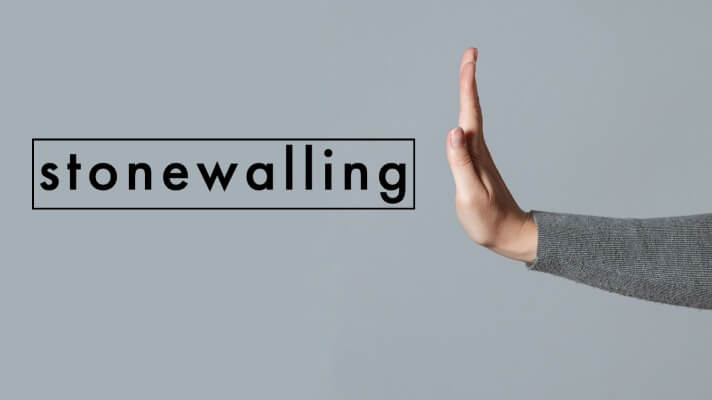Ways to Deal With Stonewalling
Stonewalling is when someone in a relationship completely shuts down and doesn’t want to talk or share anything with the other. It can gradually destroy the relationship if addressed at the right time. This behavior, especially when it is intentional and manipulative, can lead to stress, sadness, anxiety and other detrimental effects on the mental health of the people who experience it. Stonewalling is one of many possible forms of emotional disruption with severe consequences. Knowing the warning signs of harmful obstacles can help people protect themselves in relationships. Below, we’ll take a closer look at the stonewalling and discuss symptoms and strategies for addressing it.
What is Stonewalling
A partner who refuses to participate in a conversation is said to be an obstacle. When someone is doing stonewalling, they will take action to ignore or avoid the problem entirely rather than face it.
Overwhelmed and physiologically intense feelings are common causes of stonewalling. When someone experiences physiological flooding, emotions overwhelm them and prevent them from reacting. They may not think they can have rational conversations about things.
Conflict can be overwhelming and stressful, especially in intimate relationships. One partner may refuse to interact altogether or abstain when there is potential for disagreement. Examples of stonewalling are avoiding talking about your emotions, not responding to nonverbal cues, stopping a conversation midway without explanation or warning, or simply refusing to talk about the problem. When the other partner wants to speak about a controversial issue, this strategy can be frustrating, and the lack of communication can often lead to extreme anger and dissatisfaction.
Stonewalling Abuse
Emotional abuse is more painful than physical abuse. Conflicts are normal in any relationship. It is part of our life. Stonewalling can be detrimental to relationships and have many negative consequences, although it can be considered harmless.
Any partner in a relationship can practice stonewalling, which in itself is a type of emotional abuse. Relationship problems and arguments are often the result of this. Abuse is discouraged in an attempt to provide control, but we cannot control how people will react in situations. You can intentionally use stonewalling to punish your partner for specific actions. Oftentimes, it could be learned by observing one’s parents and then applying it to personal relationships.
When you choose to stonewall, you punish your spouse by withholding communication because differences must be resolved by discussing feelings. Therefore, stonewalling with the intent to cause emotional distress or harm may be considered violence. When stonewalling is done accidentally, it can sometimes be seen as a poor coping method.
Read more: Characteristics of Emotionally. Unavailable Man
Symptoms of Stonewalling
Emotional abuse can happen in any relationship, including romantic relationships, family relationships, and friendships. It can be subtle or overt and is often difficult to recognize, especially for those receiving it. Identifying stonewalling is the first step toward addressing it. Some common signs include:
- Withdrawal: The person physically or emotionally withdraws from the conversation, frequently leaving the room or refusing to make eye contact.
- Silence: They become unresponsive, offering minimal or no verbal communication.
- Deflection: They change the topic or deflect questions to avoid addressing the issue.
- Rigid body language: They may exhibit tense or withdrawn body language, such as crossed arms or a ignoring posture.
How stonewalling can hurt a relationship
Everybody stonewalls occasionally. Everyone has moments when they just can’t, and that’s okay. Only when it is ignored, does it become a problem in the relationship. Stonewalling can have disastrous consequences if it becomes a deeply ingrained practice or mutually acceptable communication style. Stonewalling leads to an unresolved issue and makes a person feel devalued or disrespected. Sometimes, people give up, leaving an emotional rift challenging to heal.
How to deal with stonewalling
Stonewalling can cause the other partner to feel ignored, devalued, and helpless. If both parties are willing to make changes, communication can be improved by listening to each other, taking responsibility for their behavior, and working together. But fear not; there are ways to end this emotional rift and promote understanding and love again.
Encourage Open Dialogue
While comparing your partner’s silence with your own may be tempting, resist the urge to cut off communication entirely. Instead, gently encourage open dialogue by expressing your desire to understand their thoughts and feelings. Use “I” statements to convey your emotions without blaming or criticizing. For example, say, “I feel hurt and confused when we can’t talk about what’s bothering us,” rather than, “You always pull away from me.”
Establish Healthy Boundaries
Healthy conversation is essential; it’s equally important to establish healthy boundaries. Communicate your needs and expectations to your partner, and be prepared to enforce boundaries if necessary. For instance, if stonewalling becomes a recurring issue, calmly express how it impacts you and discuss potential solutions. Remember that boundaries are not meant to punish or control your partner but to protect your emotional well-being.
Give Some Space and Respect your Partner’s Feelings
Respect your partner’s feelings and try to understand their emotional well-being. Recognize that stonewalling often stems from painful emotions such as fear, anxiety, or overwhelm. Let them know that you understand they may be overcome, and assure them you’re there to listen without judgment. Believe us, it will work!
Create a Safe Environment
Create an atmosphere of trust and openness by assuring them that their thoughts and feelings are valued and respected. Avoid criticism or judgmental remarks that may further fuel their defensive response.
Take a Break if Necessary
If the conversation becomes too heated or unproductive, taking a break and restarting the discussion later is okay. Use this time to relax and reflect on your feelings and reactions before re-engaging.
See a therapist
If stonewalling has become your go-to technique for dealing with difficult situations, it might be a good idea to explore the reasons for this with a counselor. Not only will they help you understand any underlying issues affecting your behavior, but they will also help you learn and practice healthier communication styles. Couples, marriage, or family counseling may be beneficial if a specific relationship requires addressing behavioral issues.
The bottom line
If ignored, stonewalling is a behavior that may significantly lead to a relationship’s breakdown. It harms both parties and doesn’t promote the open and honest communication needed to keep a relationship going for the long haul. Experts advise both parties to walk away from the conversation to clear their heads when stonewalling occurs and pick up where they left off when they’re ready to continue.
Better4U has the best therapy and online counseling service. You can talk to a counselor about your or your partner’s stonewalling and seek help to cope and improve your healthy relationship.










